新概念第二课第三课重点讲解
- 格式:doc
- 大小:141.00 KB
- 文档页数:5
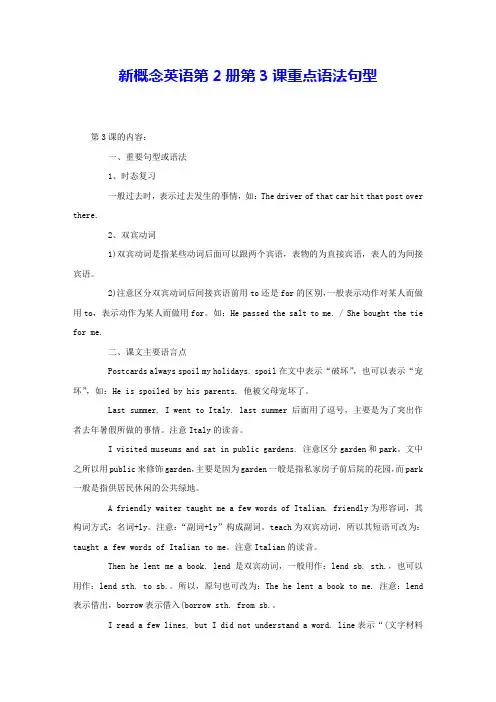
新概念英语第2册第3课重点语法句型第3课的内容:一、重要句型或语法1、时态复习一般过去时,表示过去发生的事情,如:The driver of that car hit that post over there.2、双宾动词1)双宾动词是指某些动词后面可以跟两个宾语,表物的为直接宾语,表人的为间接宾语。
2)注意区分双宾动词后间接宾语前用to还是for的区别,一般表示动作对某人而做用to,表示动作为某人而做用for。
如:He passed the salt to me. / She bought the tie for me.二、课文主要语言点Postcards always spoil my holidays. spoil在文中表示“破坏”,也可以表示“宠坏”,如:He is spoiled by his parents. 他被父母宠坏了。
Last summer, I went to Italy. last summer后面用了逗号,主要是为了突出作者去年暑假所做的事情。
注意Italy的读音。
I visited museums and sat in public gardens. 注意区分garden和park。
文中之所以用public来修饰garden,主要是因为garden一般是指私家房子前后院的花园,而park 一般是指供居民休闲的公共绿地。
A friendly waiter taught me a few words of Italian. friendly为形容词,其构词方式:名词+ly。
注意:“副词+ly”构成副词。
teach为双宾动词,所以其短语可改为:taught a few words of Italian to me。
注意Italian的读音。
Then he lent me a book. lend是双宾动词,一般用作:lend sb. sth.,也可以用作:lend sth. to sb.。
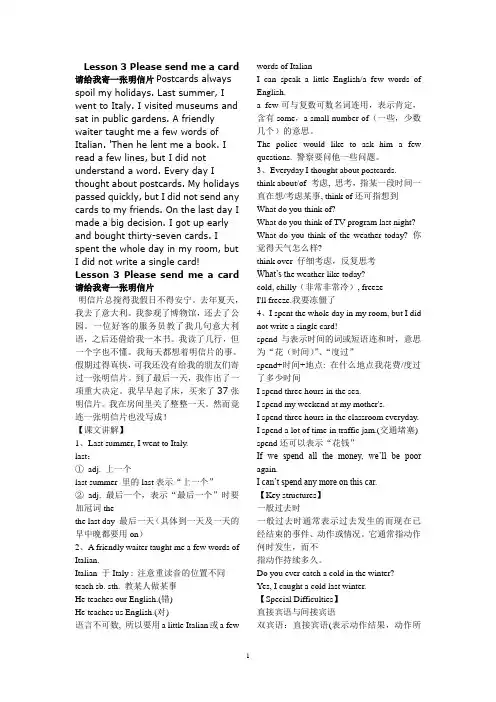
Lesson 3 Please send me a card 请给我寄一张明信片Postcards always spoil my holidays. Last summer, I went to Italy. I visited museums and sat in public gardens. A friendly waiter taught me a few words of Italian. 'Then he lent me a book. I read a few lines, but I did not understand a word. Every day I thought about postcards. My holidays passed quickly, but I did not send any cards to my friends. On the last day I made a big decision. I got up early and bought thirty-seven cards. I spent the whole day in my room, but I did not write a single card!Lesson 3 Please send me a card 请给我寄一张明信片明信片总搅得我假日不得安宁。
去年夏天,我去了意大利。
我参观了博物馆,还去了公园。
一位好客的服务员教了我几句意大利语,之后还借给我一本书。
我读了几行,但一个字也不懂。
我每天都想着明信片的事。
假期过得真快,可我还没有给我的朋友们寄过一张明信片。
到了最后一天,我作出了一项重大决定。
我早早起了床,买来了37张明信片。
我在房间里关了整整一天。
然而竟连一张明信片也没写成!【课文讲解】1、Last summer, I went to Italy.last:①adj. 上一个last summer 里的last表示“上一个”②adj. 最后一个,表示“最后一个”时要加冠词thethe last day 最后一天(具体到一天及一天的早中晚都要用on)2、A friendly waiter taught me a few words of Italian.Italian 于Italy : 注意重读音的位置不同teach sb. sth. 教某人做某事He teaches our English.(错)He teaches us English.(对)语言不可数, 所以要用a little Italian或a few words of ItalianI can speak a little English/a few words of English.a few可与复数可数名词连用,表示肯定,含有some,a small number of(一些,少数几个)的意思。
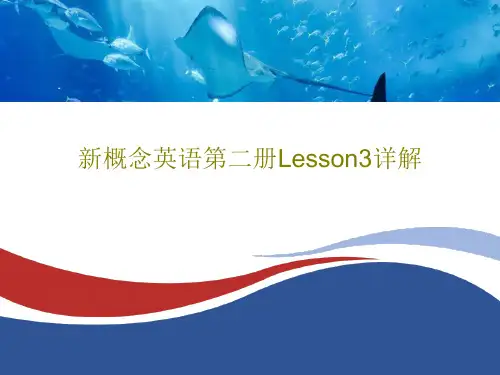
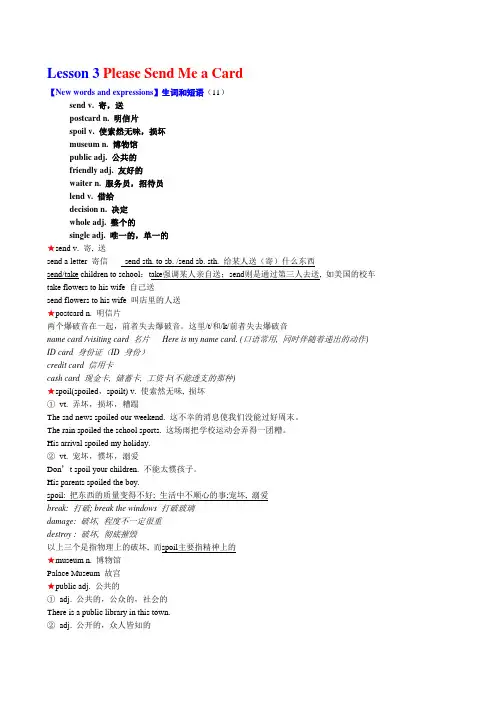
Lesson 3 Please Send Me a Card【New words and expressions】生词和短语(11)send v. 寄,送postcard n. 明信片spoil v. 使索然无味,损坏museum n. 博物馆public adj. 公共的friendly adj. 友好的waiter n. 服务员,招待员lend v. 借给decision n. 决定whole adj. 整个的single adj. 唯一的,单一的★send v. 寄, 送send a letter 寄信send sth. to sb. /send sb. sth. 给某人送(寄)什么东西send/take children to school:take强调某人亲自送;send则是通过第三人去送, 如美国的校车take flowers to his wife 自己送send flowers to his wife 叫店里的人送★postcard n. 明信片两个爆破音在一起,前者失去爆破音。
这里/t/和/k/前者失去爆破音name card /visiting card 名片Here is my name card. (口语常用, 同时伴随着递出的动作) ID card 身份证(ID 身份)credit card 信用卡cash card 现金卡, 储蓄卡, 工资卡(不能透支的那种)★spoil(spoiled,spoilt) v. 使索然无味, 损坏①vt. 弄坏,损坏,糟蹋The sad news spoiled our weekend. 这不幸的消息使我们没能过好周末。
The rain spoiled the school sports. 这场雨把学校运动会弄得一团糟。
His arrival spoiled my holiday.②vt. 宠坏,惯坏,溺爱Don’t spoil your children. 不能太惯孩子。
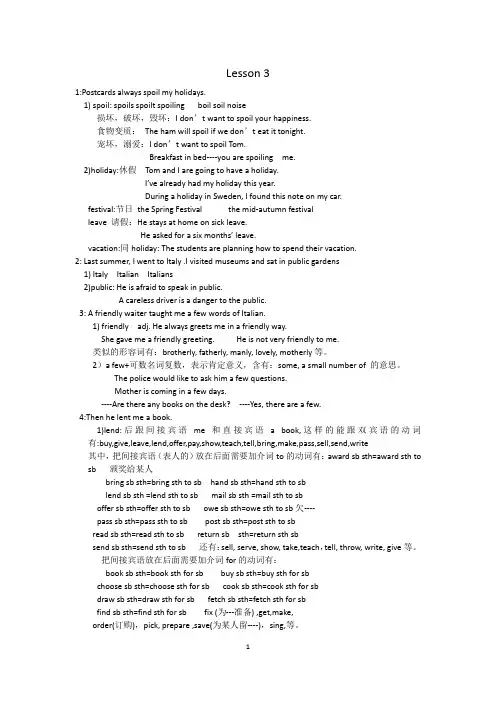
Lesson 31:Postcards always spoil my holidays.1) spoil: spoils spoilt spoiling boil soil noise损坏,破坏,毁坏:I don’t want to spoil your happiness.食物变质:The ham will spoil if we don’t eat it tonight.宠坏,溺爱:I don’t want to spoil Tom.Breakfast in bed----you are spoiling me.2)holiday:休假Tom and I are going to have a holiday.I’ve already had my holiday this year.During a holiday in Sweden, I found this note on my car.festival:节日the Spring Festival the mid-autumn festivalleave 请假:He stays at home on sick leave.He asked for a six months’ leave.vacation:同holiday: The students are planning how to spend their vacation.2: Last summer, I went to Italy .I visited museums and sat in public gardens1) Italy Italian Italians2)public: He is afraid to speak in public.A careless driver is a danger to the public.3: A friendly waiter taught me a few words of Italian.1) friendly adj. He always greets me in a friendly way.She gave me a friendly greeting. He is not very friendly to me.类似的形容词有:brotherly, fatherly, manly, lovely, motherly等。
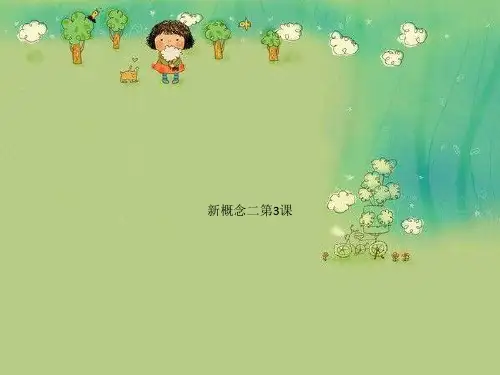
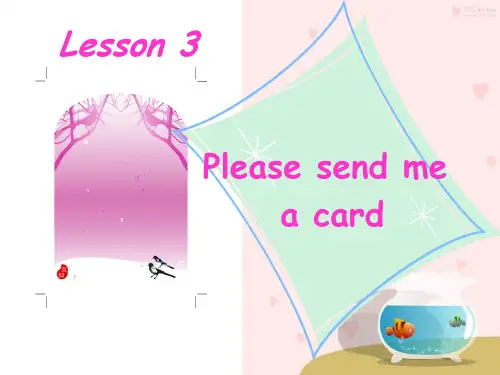
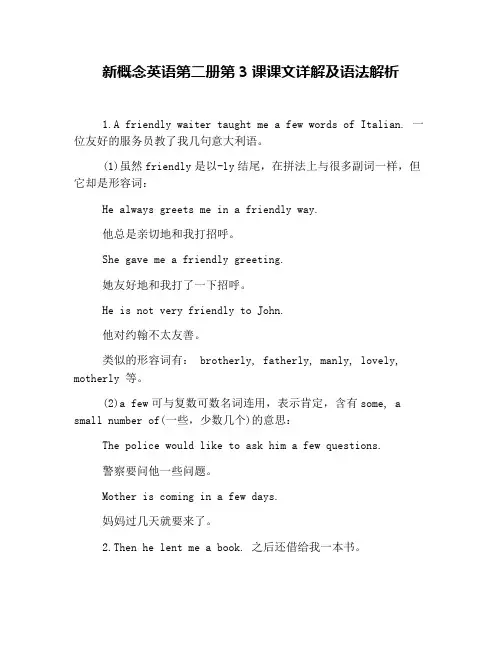
新概念英语第二册第3课课文详解及语法解析1.A friendly waiter taught me a few words of Italian. 一位友好的服务员教了我几句意大利语。
(1)虽然friendly是以-ly结尾,在拼法上与很多副词一样,但它却是形容词:He always greets me in a friendly way.他总是亲切地和我打招呼。
She gave me a friendly greeting.她友好地和我打了一下招呼。
He is not very friendly to John.他对约翰不太友善。
类似的形容词有: brotherly, fatherly, manly, lovely, motherly 等。
(2)a few可与复数可数名词连用,表示肯定,含有some, a small number of(一些,少数几个)的意思:The police would like to ask him a few questions.警察要问他一些问题。
Mother is coming in a few days.妈妈过几天就要来了。
2.Then he lent me a book. 之后还借给我一本书。
像send, buy, give等动词一样,lend能够有两个宾语:一个直接宾语(通常指物),一个间接宾语(通常指人)。
(cf. 本课语法)在这句话中,lend的直接宾语为a book,间接宾语为me。
Would you lend me your pen?能把你的笔借我用一下吗?Yesterday I lent my dictionary to Mary.昨天我把字典借给了玛丽。
3.…but I did not understand a word… 但我一个字也不懂。
not…a的否定意义比单用not要强。
课文的最后一句加了single,语气更强。
4.Every day I thought about postcards. 我每天都想着明信片的事。
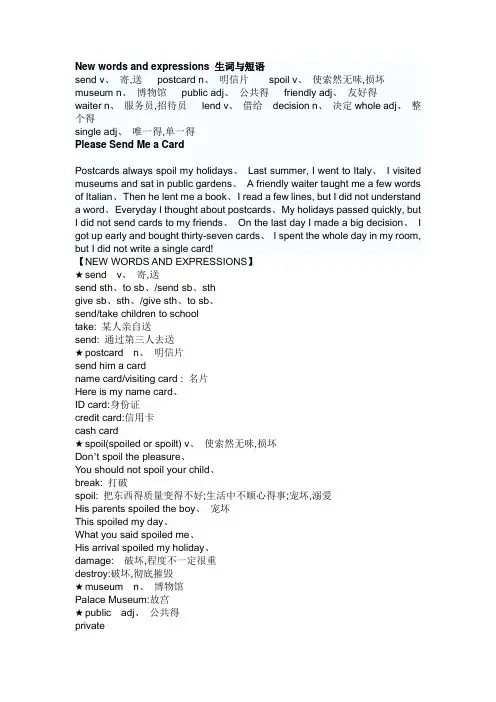
New words and expressions 生词与短语send v、寄,送postcard n、明信片spoil v、使索然无味,损坏museum n、博物馆public adj、公共得friendly adj、友好得waiter n、服务员,招待员lend v、借给decision n、决定whole adj、整个得single adj、唯一得,单一得Please Send Me a CardPostcards always spoil my holidays、Last summer, I went to Italy、I visited museums and sat in public gardens、A friendly waiter taught me a few words of Italian、Then he lent me a book、I read a few lines, but I did not understand a word、Everyday I thought about postcards、My holidays passed quickly, but I did not send cards to my friends、On the last day I made a big decision、I got up early and bought thirty-seven cards、I spent the whole day in my room, but I did not write a single card!【NEW WORDS AND EXPRESSIONS】★send v、寄,送send sth、to sb、/send sb、sthgive sb、sth、/give sth、to sb、send/take children to schooltake: 某人亲自送send: 通过第三人去送★postcard n、明信片send him a cardname card/visiting card : 名片Here is my name card、ID card:身份证credit card:信用卡cash card★spoil(spoiled or spoilt) v、使索然无味,损坏Don’t spoil the pleasure、You should not spoil your child、break: 打破spoil: 把东西得质量变得不好;生活中不顺心得事;宠坏,溺爱His parents spoiled the boy、宠坏This spoiled my day、What you said spoiled me、His arrival spoiled my holiday、damage: 破坏,程度不一定很重destroy:破坏,彻底摧毁★museum n、博物馆Palace Museum:故宫★public adj、公共得privatepublic school/place/house(pub:酒吧)in private: 私下里得in public: 公开得Why not have a conversation in public?★ Park 比较大Garden比较具有观赏价值,有不同风格得花园如Spanish garden, Italian garden private garden私家花园★friendly adj、友好得lovely adj、★waiter n、服务员,招待员waiterwaitresschief waitershop assistantattendant★ a few words 几句话I’d like to say a few words on the topic、Can I have a word with you? Have a word with sb就是固定搭配,与某人说句话★lend v、借给borrow from 向某人借lend sth、to sblend sb、sth、Can I borrow some money from you?Some people neither borrow nor lend、★decision n、决定v、decidemake a big/great decisione to a decision, arrive at a decision, reach a decision★whole adj、整个得all the、、、the whole、、、★single adj、唯一得,单一得DoubleThere wasn’t a single person on the beach、【课文讲解】The baby spoiled my night、Italian/Italy 意大利语意大利England English 英语French法语France法国German德语Germany德国Japanese日语Japan日本Spain西班牙Spanish西班牙语and 先后往往就是对等得概念teach sb、sth、a little ItalianI can speak a little English/a few words of Englishthink about: 考虑,思考think over : 仔细考虑last:表示"上一个"或"最后一个",表示"最后一个"时要加冠词theI spend the whole day in my room、spend+时间+地点I spend three hours in the sea、I spend my weekend at my mother's、I spend three hours in the classroom everyday、I spend a lot of time in traffic jam、reviewspoilsend/lend/teach sb、sth、send/lend/teach sth、to sb【Special Difficulties】翻译:1、她借了一本书给我。
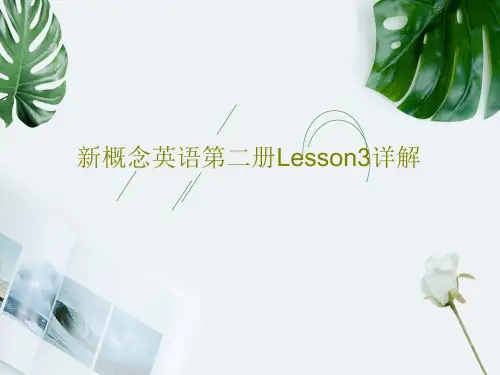
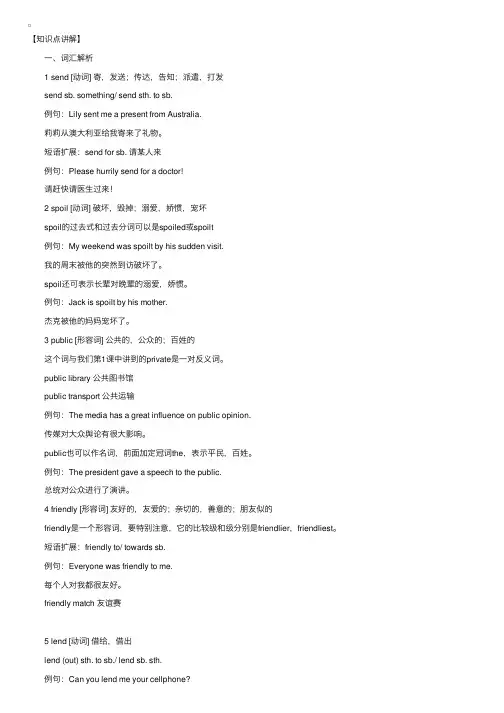
【知识点讲解】 ⼀、词汇解析 1 send [动词] 寄,发送;传达,告知;派遣,打发 send sb. something/ send sth. to sb. 例句:Lily sent me a present from Australia. 莉莉从澳⼤利亚给我寄来了礼物。
短语扩展:send for sb. 请某⼈来 例句:Please hurrily send for a doctor! 请赶快请医⽣过来! 2 spoil [动词] 破坏,毁掉;溺爱,娇惯,宠坏 spoil的过去式和过去分词可以是spoiled或spoilt 例句:My weekend was spoilt by his sudden visit. 我的周末被他的突然到访破坏了。
spoil还可表⽰长辈对晚辈的溺爱,娇惯。
例句:Jack is spoilt by his mother. 杰克被他的妈妈宠坏了。
3 public [形容词] 公共的,公众的;百姓的 这个词与我们第1课中讲到的private是⼀对反义词。
public library 公共图书馆 public transport 公共运输 例句:The media has a great influence on public opinion. 传媒对⼤众舆论有很⼤影响。
public也可以作名词,前⾯加定冠词the,表⽰平民,百姓。
例句:The president gave a speech to the public. 总统对公众进⾏了演讲。
4 friendly [形容词] 友好的,友爱的;亲切的,善意的;朋友似的 friendly是⼀个形容词,要特别注意,它的⽐较级和级分别是friendlier,friendliest。
短语扩展:friendly to/ towards sb. 例句:Everyone was friendly to me. 每个⼈对我都很友好。
新概念二Lesson3知识点整理Lesson 3 Please send me a card请给我寄一张明信片学习目标全解必记单词send v. 寄,送sent v. ( send 的过去式和过去分词)postcard n. 明信片spoil v. 使索然无味,损坏( spoiled/spoilt) museum n. 博物馆public adj. 公共的friendly adj. 友好的waiter n. 服务员,招待生lend v. 借给decision n. 决定whole adj. 整个的single adj. 唯一的,单一的常考短语make a big decision 作出一项重大决定public gardens 公共花园,公园a few words of Italian 几句意大利语a few lines 几行lend me a book 借给我一本书a single card 一张明信片on the last day 在最后一天经典句型1.Then he lent me a book.2.I spent the whole day in my room.3.I thought about postcards.4.Postcards always spoil my holiday.5.My holiday passed quickly.6.A friendly waiter taught me a few words of Italian.重点语法1. 双宾语---------直接宾语和间接宾语直接宾语:表示动作结果,动作所涉及的事物间接宾语:动作目标,动作是谁做的或为谁做的,通常是人间接宾语大多数情况下置于直接宾语之前,假如间接宾语在后,间接宾主前必须加“to”(表示动作对什么人做)或“for”(表示动作为什么人而做,可以翻译成:给、替、为)。
例:Please give me a book.间接宾语直接宾语Please give a book to me.直接宾语间接宾语(a).常见动词与to相连的give, take, pass, read, sell, buy,pay,hand,bring,show,promise(承诺),offer(提供),owe (欠)(b).常见动词与for相连的buy, order(命令,点), make, find例:I buy a book for you .make a cake for you / find sth. for sb.do sb. a favor = do a favor for sb. 帮某人一个忙2. 单词辨析spoil, break, damage, destroy注:spoil主要指精神上的而其他三个多指物理上的破坏易混词辨析例句spoil 使索然无味,损坏;宠坏,溺爱,或指把东西的质量变得不好;生活中不顺心的事。
新概念第二册第三课
新概念第二册第三课的内容主要是关于饮食习惯和健康生活方
式的讨论。
以下是对该课的详细描述:
这一课的主题是关于饮食习惯和健康生活方式的重要性。
课文
以一位女士向医生咨询自己的健康问题为背景展开。
课文开始,女士向医生诉说自己感到疲劳和缺乏活力。
医生询
问她的饮食习惯和生活方式,并指出这些因素可能是她感到疲劳的
原因。
医生建议她改变饮食习惯和生活方式,以改善她的健康状况。
接下来,医生向女士解释了健康饮食的重要性。
他告诉她应该
多吃水果、蔬菜和全谷类食物,并减少摄入高脂肪和高糖分的食物。
医生还提到了均衡饮食的概念,即摄入适量的蛋白质、碳水化合物
和脂肪,以满足身体的需求。
此外,医生还建议女士增加运动量,以提高体能和心肺功能。
他解释了运动对健康的益处,并推荐女士每天至少进行30分钟的有
氧运动,如散步、慢跑或游泳。
医生还提到了保持良好的睡眠习惯的重要性。
他建议女士每晚
保持充足的睡眠时间,并避免过度疲劳。
最后,医生总结了健康饮食和生活方式的益处,包括提高身体
免疫力、预防慢性疾病和保持良好的心理状态。
通过这一课,读者可以了解到饮食习惯和生活方式对健康的重
要影响,并获得一些实用的建议来改善自己的生活方式,以达到更
健康的生活目标。
新概念2第三课知识点【新概念2第三课知识点】在新概念英语系列教材的第二册中,第三课是一个非常重要的课程,其中包含了一些关键的知识点,帮助学习者更好地掌握英语语法和词汇。
下面是该课程的一些主要知识点的介绍:1. The Present Perfect Tense(现在完成时):这个时态用来描述发生在过去但与现在相关的动作或事件。
它由助动词“have/has”和动词的过去分词构成。
例如:“I have finished my homework.”(我已经完成作业)。
这种时态经常与“already”(已经),“yet”(还,尚),“just”(刚刚)等表示时间的副词一起使用。
2. Comparative and Superlative Forms of Adjectives(形容词的比较级和最高级):形容词用来描述人或物的特征或性质。
当我们要比较两个事物的性质时,我们使用比较级;当我们要比较三个或三个以上事物的性质时,我们使用最高级。
比较级的构成是在形容词前面加上"-er"(对于一些特殊形容词则是加上"more"),而最高级则在形容词前加上"-est"(对于一些特殊形容词则是加上"most")。
3. The Present Perfect Continuous Tense(现在完成进行时):这个时态用来描述过去开始的动作并持续到现在的情况。
它由助动词“have/has been”和动词的现在分词构成。
例如:“She has been studying English for three hours.”(她已经学习英语三个小时了)。
这个时态通常与表示时间段的短语一起使用,比如“for three hours”(三个小时)或“since last night”(从昨晚开始)。
4. Prepositions of Time(表示时间的介词):介词用来在句子中表达时间、位置或方向等关系。
新概念二第三课讲解
嘿,朋友!咱们今天来聊聊新概念二的第三课。
先瞅瞅这篇课文,它就像一个精彩的小故事,充满了有趣的情节和实用的表达。
你说,学习英语不就跟探险似的嘛,每一篇课文都是一个新的宝藏等着咱们去挖掘。
这课的单词啊,那可都是宝贝。
比如说“postcard”,明信片,咱出门旅游的时候,是不是总想着给朋友寄一张,表达一下自己的心情?还有“museum”,博物馆,那里面藏着的可都是历史的秘密和人类智慧的结晶。
语法部分呢,就像是一道道关卡。
像其中的时态运用,是不是有点像咱们在迷宫里找出口,得看准了方向才能走对路?还有句型结构,就好比搭积木,得一块一块放对地方,才能搭出漂亮的城堡。
再来说说课文里的句子,那可真是句句经典。
“He bought a new car.’ 多简单直接,可就是这样的句子,咱们要是能运用自如,那交流起来不就顺溜多啦?
想象一下,要是咱们能把这课里的知识都装进脑袋,就像把武器放进背包,遇到英语的难题,咱就能轻松应对,那得多牛啊!
读课文的时候,可得仔细,一个单词一个句子都别放过。
就像在花园里赏花,每一朵都有它的美,都值得咱们细细品味。
练习部分也不能马虎,这就好比是练功,只有多练,招式才能熟练,功夫才能到家。
说到这,你是不是觉得新概念二的第三课其实没那么难,只要咱们
用心去琢磨,去体会,就能把它拿下?反正我是这么觉得的!
总之,新概念二第三课就像是一把钥匙,能帮咱们打开英语学习的
新大门。
只要咱们认真对待,努力学习,还怕学不好英语?别犹豫啦,赶紧行动起来吧!。
Lesson 3 Please Send Me a Card【New words and expressions】生词和短语(11)send v. 寄,送postcard n. 明信片spoil v. 使索然无味,损坏museum n. 博物馆public adj. 公共的friendly adj. 友好的waiter n. 服务员,招待员lend v. 借给decision n. 决定whole adj. 整个的★send v. 寄, 送send a letter 寄信send sth. to sb. /send sb. sth. 给某人送(寄)什么东西send/take children to school:take强调某人亲自送;send则是通过第三人去送, 如美国的校车take flowers to his wife 自己送send flowers to his wife 叫店里的人送★postcard n. 明信片两个爆破音在一起,前者失去爆破音。
这里/t/和/k/前者失去爆破音name card /visiting card 名片Here is my name card. (口语常用, 同时伴随着递出的动作) ID card 身份证(ID 身份)credit card 信用卡cash card 现金卡, 储蓄卡, 工资卡(不能透支的那种)★spoil(spoiled,spoilt) v. 使索然无味, 损坏①vt. 弄坏,损坏,糟蹋The sad news spoiled our weekend. 这不幸的消息使我们没能过好周末。
The rain spoiled the school sports. 这场雨把学校运动会弄得一团糟。
His arrival spoiled my holiday.②vt. 宠坏,惯坏,溺爱Don’t spoil your children. 不能太惯孩子。
His parents spoiled the boy.spoil: 把东西的质量变得不好; 生活中不顺心的事;宠坏, 溺爱break: 打破; break the windows 打破玻璃damage: 破坏, 程度不一定很重destroy : 破坏, 彻底摧毁以上三个是指物理上的破坏, 而spoil主要指精神上的★museum n. 博物馆Palace Museum 故宫★public adj. 公共的①adj. 公共的,公众的,社会的There is a public library in this town.②adj. 公开的,众人皆知的Their secret meeting was made public 20 years later. 他们的秘密会晤20 年以后才被公开。
public place 公共场所in public 公开的;in private 私下里的Let’s have a conversation in private. 让我们私下谈谈?Why not have a conversation in public? 为什么不公开谈呢?(当面说呢?)③n. 公众,群众,大众The public is/are pleased with his explanation. 公众对他的解释很满意。
The museum is open to the public on Sunday.★friendly adj. 友好的friendly是形容词,单独使用时一般做定语;作为状语表示这个人做什么事情很友好, 用短语in a friendly wayShe gave me a friendly greeting.He always greets me in a friendly way.以-ly结尾的形容词还有lovely,brotherly,fatherly,manly,motherly★waiter n. 服务员, 招待员waiter(男服务员), waitress(女服务员), 只出现在餐馆里chief waiter 领班I want to see the chief waiter. 我要见你们的领班。
shop assistant 商店里的店员attendant n. (其他公共场所的)服务员★lend v. 借给lend to(借出):lend sth. to sb/lend sb. sth.Can you lend me $20 please? I’ll pay/give it back tomorrow.borrow from(借进):borrow sth. from sb./borrow sth. (borrow 不能用borrow sb sth.)He borrowed my pen yesterday. He hasn’t given me it yet.★decision n. 决定make /take a decision 作出决定It was not easy for me to make/take this decision.make a big/great decision (big:重大;great:伟大, 更重大) decide v. 决定★whole adj. 整个的a whole bottle of milk 一整瓶牛奶the whole…,the whole day 整天,two whole weeks 整整两星期all the…,all the day (the可省略) 整天all the week整个星期all the money所有的钱all of后面如果加代词, 代词前面不需要修饰词;一旦要加名词, 前面一定要加theall of us;all of the students★single adj. 唯一的, 单一的反义词: double 双倍的【Text】明信片总搅得我假日不得安宁. 去年夏天, 我去了意大利. 我参观了博物馆, 还去了公园. 一位好客的服务员教了我几句意大利语, 之后还借给我一本书. 我读了几行, 但一个字也不懂. 我每天都想着明信片的事. 假期过得真快, 可我还没有给我的朋友们寄过一张明信片. 到了最后一天, 我作出了一项重大决定.我早早起了床, 买来了37 张明信片. 我在房间里关了整整一天. 然而竟连一张明信片也没写成!【课文讲解】1、Last summer, I went to Italy.last:①adj. 上一个last summer 里的last表示“上一个”②adj. 最后一个,表示“最后一个”时要加冠词thethe last day 最后一天(具体到一天及一天的早中晚都要用on)2、A friendly waiter taught me a few words of Italian.Italian 于Italy : 注意重读音的位置不同teach sb. sth. 教某人做某事He teaches our English.(错) He teaches us English.(对)语言不可数, 所以要用a little Italian或a few words of ItalianI can speak a little English/a few words of English.a few可与复数可数名词连用,表示肯定,含有some,a small number of(一些,少数几个)的意思。
The police would like to ask him a few questions. 警察要问他一些问题。
3、Everyday I thought about postcards.think about/of 考虑, 思考,指某一段时间一直在想/考虑某事, think of还可指想到What do you think of the weather today? 你觉得天气怎么样?think over 仔细考虑,反复思考think it over4、I spent the whole day in my room, but I did not write a single card!spend与表示时间的词或短语连和时,意思为“花(时间)”、“度过”spend+时间+地点: 在什么地点我花费/度过了多少时间I spend my weekend at my mother's.spend还可以表示“花钱”If we spend all the money, we’ll be poor again.【Key structures】一般过去时与一般现在时【Special Difficulties】直接宾语与间接宾语双宾语:直接宾语(表示动作结果,动作所涉及的事物)和间接宾语(动作目标,动作是谁做的或为谁做的,通常是人) 。
动词+间接宾语大多数情况下置于直接宾语之前,如果间接宾语在后,间接宾主前必须加“to”(表示动作对什么人做)或“for”(表示动作为什么人而做)。
give sb. sth./give sth to sb间接宾语在后面时, 其前必须加to(对……而言)或for(为……而做)。
可以翻译为“给”、“替”、“为”的,就用for;如果只能翻译为“给”的, 就用to与to相连的give, take, pass, read, sell, buy,pay,hand,bring,show,promise,offer,owetake flowers to my wife.与for 相连的buy, order, make, find,doI buy a book for you .make a cake for youfind sth. for sb.I do something for you.do sb. a favor 帮某人一个忙Do me a favor please./Do a favor for me? 帮我一个忙Can I order something for you? Can I buy you a bottle of beer ? 意为我请你喝杯酒的意思【Multiple choice questions】4 ___a___ him a few words of Italian? The waiter.a. Who taughtb. Who did teachc. What did he teachd. Whom did he teach人做主语提问——who 对宾语提问——whomwho既可以对主语提问也可以对宾语提问, 而whom只能对宾语提问如果对主语提问, 则句子的语序和陈述句语序一样;如果对非主语来提问, 则句子要使用特殊疑问词+ 一般疑问句的语序Who/Whom did the waiter teach a few words of Italian?5 He was a friendly waiter. He spoke to the writer ___d___ .a. friendb. as friendsc. like friendsd. in a friendly wayHe spoke to the writer like a friend.in...way :以...方式, 作为状语表示这个人做什么事情很友好, 用短语in a friendly way7 He spent the whole day in his room. He was in his room ___c___ day.a. the holeb. the allc. alld. all ofall (the) dayall of 后面如果加代词, 代词前面不需要修饰词all of us;一旦要加名词, 前面一定要加theall of the friends,all of my friends,all of the students10 On the last day he made a big decision. It was the ___a___ day of his holiday.a. finalb. endc. latestd. bottomfinal——形容词end——名词/动词latest——形容词bottom——名词latest adj. 最新的latest news;latest style 新款11 He made a big decision. He ___b___ .a. thought about itb. made up his mindc. changed his mindd. made a wishthink about:考虑、思考、想make up one's mind:下定决心change one's mind:改变主意make a wish : 许个心愿, 愿望, 许愿Key to KS ExercisesA went (1.1); visited (I.2); sat (I.2); taught (1.2); lent;read (1.3); did not understand; thought (1.4); passed (1.5); didnot send (1.5); made; got up (1.6); bought (1.7); spent (1.7); did not write (1.8)C ⋯Roy died last year ⋯ left me ⋯ spent a lot of money⋯bought one or two⋯ never went to the cinema ⋯ stayed at home ⋯listened to music ⋯ often lent CDs ⋯ they kept them ⋯ lost many CDs ⋯Key to SD Exercises1 He paid some money to the shopkeeper.2 He handed the prize to me.3 The waiter brought the man a bottle of beer.4 He sold me all his books.5 The shop assistant found me some curtain material.6 He did a big favour for me.7 She showed her new hat to her husband.8 She promised the finder a reward.9 He gave some advice to his son.10 His uncle left some money to/for him.11 He is teaching us English.12 I bought you this bunch of flowers.13 Bring me that book please.14 He offered a cigarette to me.15 Read the first paragraph to me.16 I've ordered you some soup.17 I owe a lot of money to him.18 Pass your father the mustard.Key to Multiple choice questions1 c2 a3 c4 a5 d6 b7 c8 c9 b 10 a 11 b 12 bKey to Sentence structureI did not send any cards to my friends.。